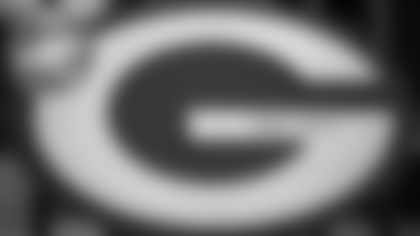Susan from Nashville, TN
The thoroughness with which you answer questions, particularly the in-depth treatment of players during the Lambeau era, has prompted me to write you. I've read the names of so many of the Packer players I grew up hearing about from my parents or visiting with on summer vacations. My Daddy, of blessed memory, was Buford "Baby" Ray. He played for Curly for 11 seasons. I have tried, since the early '70s, with little or no success, to have my Daddy enshrined in the Hall of Fame in Canton. He should be there, where so many of his teammates are already honored. I have written to everyone I can think of: sportswriters, members of the Board of Directors of the PFHOF, the Commissioner, ANYONE I could think of. My Daddy spent his whole career involved in football: from player to coach to area scout. When he played for the Packers, he played the entire game, offense and defense. I know linemen rarely get the credit they deserve but, my Daddy most certainly deserves credit for his contributions to the game. I'm an old lady now and have spent many years trying to see that my Daddy receives the honor he deserves. (All these efforts will end once I'm gone. So, I persist.) I tried so hard to have this happen while he was still with us. He never knew because he would have been mortified by my efforts. He was a humble man; a man of great achievement but, a very humble man nonetheless; my Mama's "gentle giant." If you can do anything to help me in my efforts, I would be very grateful.
Let me start by saying, I admire both your passion and your frustration. And your efforts to try and get your father into the Pro Football Hall of Fame are commendable. Not only that, you have a strong case to make and I'm guessing you've done your best.
Also, I knew your dad. As a young reporter for the Green Bay Press-Gazette in the 1970s, I'd talk to him occasionally on his trips to Green Bay after he became a fulltime area scout for the Packers in 1971. In the summer of 1978, I conducted an extensive interview with him on scouting and the draft.
He was an engaging gentleman, and I remember him mostly for enlightening me about the lexicon of scouts, or at least his lexicon.
Among the sayings he shared with me were:
A player lacking speed: "He might meet a snail, but he'd never overtake one." On a flanker with good hands: "He could catch a BB in the dark." On a receiver reluctant to sell out on passes across the middle: "He won't go in the briar patch."
Baby Ray played for the Packers from 1938-48 and made the NFL's 1940s All-Decade Team at tackle. He was one of the first big men in pro football at 6-foot-6 and 249 pounds, and he played on two of Curly Lambeau's NFL championship teams.
Ray didn't miss a game in his first five seasons and missed only four in his 11 seasons. He made at least one first team all-pro in 1939, '41, '43 and '45. And he made big plays as a tackle, including a recovered fumble that set up the game-winning field goal with less than a minute left in a 24-22 victory over the Chicago Cardinals in 1938, when the Packers won the division by one game, and a blocked punt for a safety in a title-clinching 12-7 victory over Detroit in the 1939 regular-season finale.
Bob Waterfield, Hall of Fame quarterback for the Los Angeles Rams from 1945-52, picked Ray as one of two defensive tackles on his all-time opponent team. Milwaukee Sentinel sportswriter Stoney McGlynn, who was a tackle and captain of a star-studded team at Lawrence College in the early 1920s, once wrote about your dad: "He's the closest thing to the raw-meat type of tackle the Packers haven't had since Cal Hubbard used to train on TNT for sessions with the Giants and Bears."
Why isn't Ray in the Hall of Fame?
First and foremost, I think he was at a disadvantage because he played on teams that were loaded with talent. For example, I would be hard-pressed to pick the best candidate among your dad and three of his teammates: center-linebacker Charley Brock, defensive end-blocking back Larry Craig and guard Buckets Goldenberg.
Brock was one of the best centers in the game but more importantly an exceptional defender. He intercepted 28 passes as a linebacker, including eight as a rookie, which was the year before picks were recorded as an official statistic. That would still be the Packers' record for interceptions by a linebacker.
As for Craig, all-time great Sammy Baugh said he was the best pass rusher he ever faced and best blocking back he ever saw. Waterfield also picked Craig on his all-time, all-opponent team as a defensive end. Goldenberg played 13 seasons, the Packers' team record until Dave Hanner tied it in 1964, and was Lambeau's choice as one of his two greatest guards, along with Mike Michalske.
What's more, there were other outstanding linemen on your dad's teams. Four of the 11 linemen on the NFL's 1930s All-Decade Team were Packers: tackle Bill Lee, guards Goldenberg and Russ Letlow, and center George Svendsen. Besides your dad, Brock also made the 1940s All-Decade Team.
Svendsen, Letlow and Lee were recognized as outstanding players, too, but they don't pass the longevity test. Svendsen made the 1930s all-decade team, playing only three seasons – he played two more in the 1940s – because he was viewed by many as a dominant player. Letlow played eight seasons but two were abbreviated; Lee played six with the Packers but two of those were abbreviated.
To be honest, another reason is that the people running the Pro Football Hall of Fame, going back to its beginning, didn't get much right about Packers history and from all appearances never really made an effort to dig into it.
Considering how the Packers dominated pro football from 1929-44, even more so than the Bears, they could easily have another handful of players in Canton, including your dad. But, sadly, I think the time has passed for him, Brock, Craig and Goldenberg.
During the above 16-season stretch, the Packers won six NFL titles compared to the Bears' four, yet the Bears have 11 players from that period in Canton and the Packers, seven. And if you go to Canton and dig through the files in the archives there, it becomes obvious that Halas had considerable influence over the Hall of Fame voting and Lambeau almost none.
Brian from Sugar Land, Texas
What keeps Andrew B. Turnbull out of the Pro Football Hall of Fame? Without him, there is no Green Bay Packers. When I see Bob Kraft selected as a finalist for HOF enshrinement, Turnbull's contributions far exceed anything Kraft did for the NFL. In fact, Turnbull's idea of public stock to float the team continues to reap dividends, and further seals the relationship between fans and the team. Has Turnbull ever been presented or considered?
As far as I know, Turnbull has never received serious consideration, at least not since the first year of Pro Football Hall of Fame balloting.
I agree with your comparison to Kraft. He hired Bill Belichick, and the Patriots drafted Tom Brady on his watch. If not for those two decisions, the latter of which he probably had nothing to do with, would he even be in the conversation as a Hall of Fame candidate? Former Packers president Dominic Olejniczak never was for hiring Vince Lombardi.

No question, if not for Lambeau and Turnbull combined, there would be no Green Bay Packers today. Turnbull, with the aid of Green Bay attorney John Kittell, conceived the idea of creating the public Green Bay Football Corporation in 1923, without which, the Packers wouldn't have survived.
From a business standpoint, Turnbull ushered the Packers through the years when 21 of the 24 cities that competed over the league's first three seasons lost their teams. The only three that didn't were Chicago, Green Bay and Dayton, which lost its Triangles by 1930.
That the Packers survived is a miracle. And, today, without the Packers, their many cherished traditions and Lambeau Field, the NFL would be without its most compelling and tug-at-the-heartstrings story of its first 104 seasons.
Granted, Turnbull's time as president of the team was brief, just five seasons. But, again, over those five seasons and for a short time thereafter, he was arguably as influential as any owner or other head of a franchise.
Turnbull was president of the Packers from Sept. 17, 1923, through June 27, 1928, and the only owners from that period whose franchises have survived were Halas, Chris O'Brien of the Chicago Cardinals and Tim Mara of the New York Giants.
I've got copies of the NFL meeting minutes from the 1920s, and it's obvious that Turnbull was a well-respected voice in the room.
On Jan. 26, 1924, in what I believe was the first league meeting that he attended, he was appointed to the first committee that was formed that day to study the advisability of creating geographical lines to determine the schedule. Eighteen teams were in attendance at the meeting.
Two years later, at the annual winter meeting in Detroit, over the weekend of Feb. 6-7, league president Joe Carr issued a report about how the 6-year-old NFL's constitution and bylaws had become obsolete. Immediately following Carr's presentation, a motion to appoint a seven-man committee to redraft the constitution and bylaws passed, and Turnbull was named chairman.
In 1927, when the NFL trimmed its number of franchises from 22 to 12, and almost of the league's small cities lost their teams, Turnbull not only galvanized the businessmen of Green Bay to support a $1,000 increase in the league's fee, as a guarantee that teams would finish their season, but he seconded the motion at the first of the league's three meetings that year and had already convinced the others to hold the second meeting in Green Bay. To this day, it is the only time an NFL meeting has been held in Green Bay.
On Feb. 11, 1928, in what was Turnbull's final meeting as Packers president, he was appointed to the NFL's five-member executive committee.
I can't verify this but as an owner of the Green Bay Press-Gazette and highly successful businessman, Turnbull perhaps had more acumen in that area than any of the other owners and that explained his rapid rise in stature in league circles.
When Halas was hired by the Staley Manufacturing Co., in March 1920, it was basically to play baseball and football for the company team. What's more, when company president A.E. Staley dropped out of the picture, and the Staleys moved from Decatur, Ill., and became the Chicago Bears, Halas was only a co-owner along with Edward "Dutch" Sternaman until 1931.
Even Carr, the league president, didn't have a business background. He started out as a machinist before becoming an assistant sports editor in Ohio, and perhaps that's why he sought out Turnbull's counsel on important business matters as much as anyone in the league.
I have a copy of a sample ballot of the Pro Football Hall of Fame nominations in 1963, when the first class was inducted, and there were 16 non-players – what today are considered contributors – listed.
Three of them had ties to the Packers: Lambeau, Turnbull and George Whitney Calhoun. And there were only five men on the ballot nominated as team founders: Lambeau and Turnbull, Mara and Dr. Harry March of the Giants, and George Marshall of Washington. Carr and Bert Bell also had backgrounds as owners or team managers, but they were nominated for their contributions as league president and commissioner, respectively.
That ballot was created 43 years after the league was organized, so it covered more than 40 percent of the NFL's existence and no doubt Turnbull's support was backed by people who were eyewitnesses to his involvement in league and committee meetings.
Interestingly, Art Rooney of Pittsburgh and Charles Bidwell of the Cardinals, both of whom had been in the league for 30 years at that point and weren't listed on the ballot – maybe because of their teams being perennial losers – were inducted into Canton in 1964 and '67, respectively, while Turnbull never was.
There are 11 owners in the Hall of Fame today, not counting those who were inducted more for what they accomplished in other positions: Carr, Bell, Halas, Paul Brown and Al Davis. Of the 11, one could make a convincing argument that Turnbull contributed more to the league than Bidwell, Pat Bowlen, Eddie DeBartolo, Jerry Jones and Ralph Wilson.
Does Turnbull still have a chance to be inducted into Canton?
To be honest with you, I don't believe there's even a remote possibility of it. As a former member of the selection committee, it wouldn't surprise me if not a single member of the current one – with the exception of Pete Dougherty, the Green Bay representative, and NFL historian Joel Bussert – would even recognize Turnbull's name.
Looking at it through the lens of 104 years of history rather than 43, would I vote for Turnbull if I was still on the committee?
To be honest, probably not.
One, as a member of the committee, I was opposed to electing almost all of those recent owners. As I pointed out once in a selection meeting, Major League Baseball started more than 50 years before the NFL, and it has fewer owners in Cooperstown than there are in Canton.
Two, also as a member of the committee, when Don Coryell was first discussed as a finalist based on his contribution to the passing game, I asked: How many coaches are we going to induct for reinventing the wheel? Sid Gilman was inducted in 1983 for being "The Father of the Modern Passing Game," and Bill Walsh was inducted in 1993 mostly for winning three Super Bowls but also for his innovative contributions to the modern passing game.
Thus, I'd consider myself a hypocrite if I advocated for Turnbull's induction in this post.
Based on league minutes, I think Packers leadership, as a team, including Lambeau on football matters, and Turnbull and Lee Joannes (1930-47) as team presidents, might have been more influential in keeping the league alive and putting it on the cusp of becoming America's most popular sport by 1963 than maybe any other coach-owner combination than Halas, who was actually both.
While Turnbull remained an active member of the Packers' executive committee until 1949, he only occasionally attended league meetings after 1930, passing the baton first to Dr. W.W. Kelly for a brief period and then to Joannes.
Lambeau was inducted as a charter member of the Pro Football Hall of Fame as a coach but also for founding the Packers and overseeing their survival. And while Turnbull might have played an equally important role in keeping them alive during the 1920s and beyond, he wasn't alone among local businessmen or community leaders.















